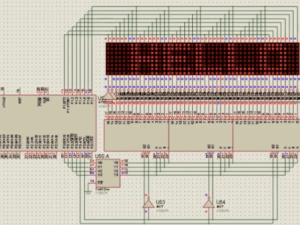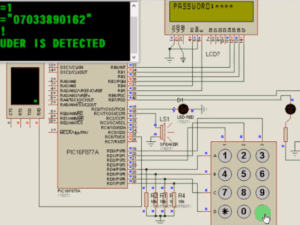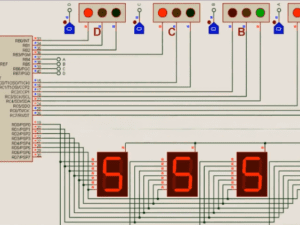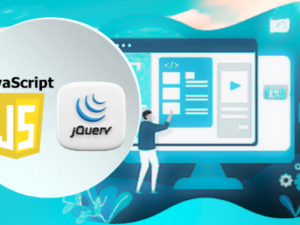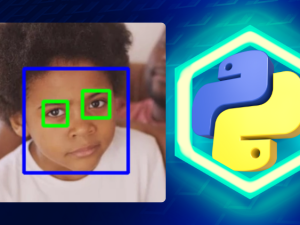Arduino Programming with Proteus Simulation for Absolute Beginners
Master Arduino Programming with Proteus Simulation: A Complete Guide with hands-on practical from scratch for Absolute Beginners.
- Description
- Curriculum

Are you eager to dive into the world of electronics and microcontroller programming? “Arduino Programming with Proteus Simulation for Absolute Beginners” is the perfect course for you! This comprehensive guide takes you through the essentials of Arduino programming and simulation using Proteus IDE, making it easy for anyone to start building exciting projects from scratch.
What You’ll Learn:
Section 1: Setting Up the Arduino Environment
- How To Download Arduino Sketch: Step-by-step instructions to download the Arduino IDE.
- Download And Installation Of Arduino Library: Learn how to install necessary libraries for your projects.
- How To Save Our Arduino Project: Tips on organizing and saving your Arduino projects.
- How To Locate Hex File Of Our Arduino Project: Understand where to find the compiled code for your projects.
- Your First Arduino Project: A hands-on introduction to creating your first Arduino project.
Section 2: Mastering the Basics of Arduino Programming
- Basic Structure: Understand the foundation of an Arduino sketch.
- How To Write Functions: Learn to create reusable blocks of code.
- Curly Braces, Semicolons, Comments: Essential syntax elements explained.
- Variables and Variable Declaration: How to store and manage data.
- Variable Scope and Data Types: Scope of variables and different data types in Arduino.
- Arrays, Arithmetic, Comparison, Logical Operators: Manipulate data efficiently.
- Constants, If Statement, If Else Statement, Else If Statement: Conditional statements for decision making.
- Switch Case, For Loop, While Loop, Do While Loop: Control flow statements to execute repetitive tasks.
- PinMode Of Arduino: Configuring digital pins as input or output.
- Digitalwrite And Digitalread: Control and read digital signals.
- Analogwrite And Analogread: Work with analog signals.
- Delay In Arduino Program: Timing functions.
- Minimum And Maximum: Using built-in functions for comparisons.
Section 3: Simulating Arduino in Proteus IDE
- Led And Push Button In Arduino: Control LEDs and buttons.
- Seven Segment Display With Arduino: Display numbers using seven segments.
- Reading Analog Input In Arduino: Read sensor data.
- Arduino PWM With LED: Pulse Width Modulation control.
- LCD Interface With Arduino: Display text on LCDs.
- Digital Fahrenheit Thermometer With Arduino: Build a digital thermometer.
- Digital Celsius Thermometer With Arduino: Celsius temperature measurement.
- Serial Transmission In Arduino: Communicate with other devices.
- Serial Receiver In Arduino: Receive data from external sources.
- Servo Motor Control With PWM: Control servo motors with precision.
- Servo Motor Control With Potentiometer: Use potentiometers to control servo motors.
Benefits of Taking This Course:
- Comprehensive Learning Path: Covers everything from setting up the environment to advanced simulations.
- Hands-On Experience: Practical projects to reinforce learning.
- Expert Instruction: Clear explanations and step-by-step guidance from experienced instructors.
- Flexible Learning: Learn at your own pace with lifetime access to course materials.
- Real-World Applications: Skills applicable to a variety of projects and industries.
Why Choose This Course:
- Beginner-Friendly: No prior experience needed.
- Detailed Explanations: Each step and concept is thoroughly explained.
- Simulation Skills: Learn to simulate your projects in Proteus, enhancing your understanding and troubleshooting skills.
- Versatile Projects: Wide range of projects to build a strong foundation.
Intended Audience:
- Absolute Beginners: Anyone new to Arduino and microcontroller programming.
- Hobbyists and Tinkerers: Those who enjoy building and experimenting with electronics.
- Students and Educators: Ideal for academic projects and teaching materials.
- Aspiring Engineers: Perfect for those looking to start a career in electronics and embedded systems.
Course Requirements:
- Basic Computer Skills: Ability to navigate and use a computer.
- Arduino Kit: An Arduino board and basic components (LEDs, resistors, buttons, etc.).
- Proteus IDE: Installation of Proteus for simulation (instructions provided in the course).
- Curiosity and Enthusiasm: A willingness to learn and experiment.
Enroll in “Arduino Programming with Proteus Simulation for Absolute Beginners” today and start your journey into the exciting world of electronics and microcontroller programming!
CLAIM YOUR FREE CODING BOOK
Setting Up Arduino Environment
Mastering Basics of Arduino Programming
-
7Basic Structure6:46 mins
-
8How To Write Functions5:06 mins
-
9Curly Braces3:09 mins
-
10Semicolons3:29 mins
-
11Comments5:41 mins
-
12Variables3:57 mins
-
13Variable Declaration4:48 mins
-
14Variable Scope4:22 mins
-
15Data Types8:15 mins
-
16Arrays7:11 mins
-
17Arithmetic Operator6:49 mins
-
18Comparison Operator3:31 mins
-
19Logical Operator6:39 mins
-
20Constants5:18 mins
-
21If Statement5:15 mins
-
22If Else Statement4:20 mins
-
23Else If Statement4:55 mins
-
24Switch Case4:22 mins
-
25For Loop6:09 mins
-
26While Loop2:45 mins
-
27Do while Loop2:18 mins
-
28CRT PinMode Of Arduino5:25 mins
-
29Digitalwrite And Digitalread3:52 mins
-
30Analogwrite And Analogread6:01 mins
-
31Delay In Arduino Program3:20 mins
-
32Minimum And Maximum3:19 mins
Arduino Simulations with Proteus IDE
-
33Led And Push Button In Arduino6:34 mins
-
34Seven Segment Display With Arduino9:03 mins
-
35Reading Analog Input In Arduino7:30 mins
-
36Arduino PWM With LED7:18 mins
-
37LCD Interface With Arduino6:48 mins
-
38Digital Fahrenheit Thermometer With Arduino9:18 mins
-
39Digital Celsius Thermometer With Arduino3:42 mins
-
40Serial Transmission In Arduino4:39 mins
-
41Serial Receiver In Arduino9:13 mins
-
42Servo Motor Control With PWM9:36 mins
-
43Servo Motor Control With Potentiometer2:29 mins
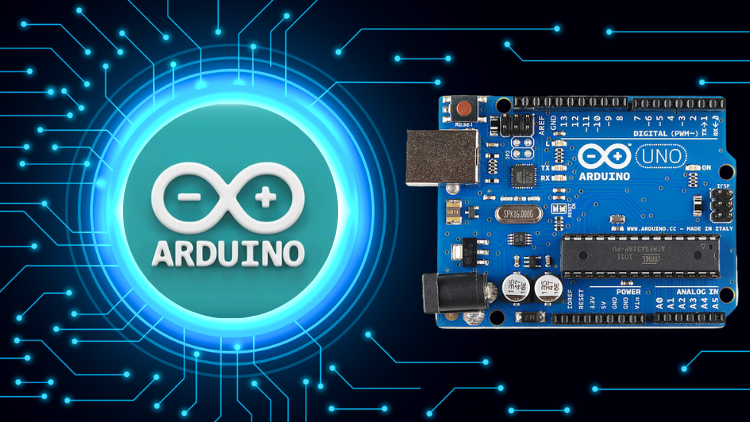
One Time Payment + FREE Coding Book! • Certificate included
Arduino Programming with Proteus Simulation for Absolute Beginners
Share
Course details
Duration
5hrs 10mins
Lectures
43
Level
Beginner
Includes Certificate of Completion
Lifetime Access
Available on All Devices
Popular courses

